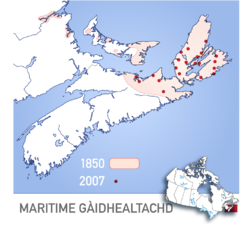Gàidhealtachd
The Gàidhealtachd (kɛːəl̪ˠt̪əxk) is those parts of Scotland (all within the Highlands and the Hebrides) in which the Scottish Gaelic language is spoken. The name as used today is a conceptual name, adapted from the corresponding Irish word, Gaeltacht, which refers to Irish-speaking areas of that island.
The term is also used to apply to the Gaelic-speaking districts of Canada, found in Nova Scotia and Glengarry County, Ontario.
The term An Ghàidhealtachd is used in Gaelic to refer to the Highlands, though most parts of the Highlands no longer have substantial Gaelic-speaking populations, and many parts have for many centuries spoken Scots or English as for example in Caithness, Cromarty, Grantown-on-Spey and Campbeltown. Conversely, several Gaelic-speaking communities lie outwith the heart of the Highlands, as for example the Arran, and into the late Middle Ages parts of Galloway spoke a form of Gaelic, possibly brought by Irish settlers.
Today, Gaelic is spoken as a native tongue is largely confined to the Outer Hebrides, Skye and some of the Inner Hebrides and adjacent coasts.
Galldachd, meaning "Land of the Foreigners" is often by Gaels for the Lowlands (though oddly the Hebrides, one of the strongholds of the Gaelic language, are known as Innse Gall – "Foreigners' Islands" – due to historical dominance by Norsemen.
History
Until a few centuries ago, the Gàidhealtachd would have included most of modern-day Great Britain north of the Firth of Forth and Galloway too, excepting Orkney and Shetland, as evidenced by the prevalence of Gaelic-derived place names throughout those lands and contemporary accounts. Prominent Gaelic-named towns and regions include Dundee from the Gaelic Dùn Deagh, Inverness from Inbhir Nis, Argyll from Earra-Ghàidheal, Galloway from Gall-Ghaidhealaibh, and possibly Stirling from Sruighlea (though the etymology is uncertain; see article). Almost all villages and mountains in the Highlands bear Gaelic names.
For historical reasons, including the influence of a Scots-speaking royal court in Edinburgh and the plantation of merchant burghs in much of the south and east, the Gàidhealtachd has been reduced massively to the present region of the Outer Hebrides, and the North-West Highlands, Skye and Lochalsh and Argyllshire. The Highland Clearances of the 18th and 19th centuries also contributed to the decline of the language, as they reduced the population of the Highlands, which were predominantly Gaelic-speaking at the time. The Clearances also sent Highlanders across the ocean to Canada, where some created the Canadian Gàidhealtachd.
Canadian Gàidhealtachd

Scottish Gaelic has survived among communities descended from immigrants in parts of Nova Scotia (especially Cape Breton Island), Glengarry County in present day Ontario, Prince Edward Island, and Newfoundland.